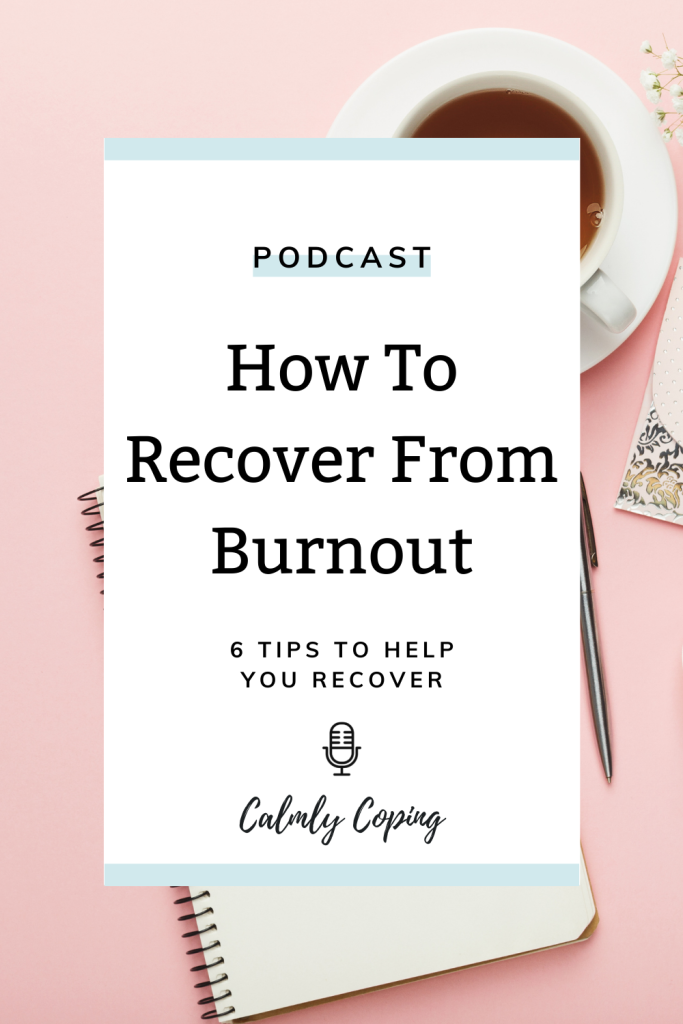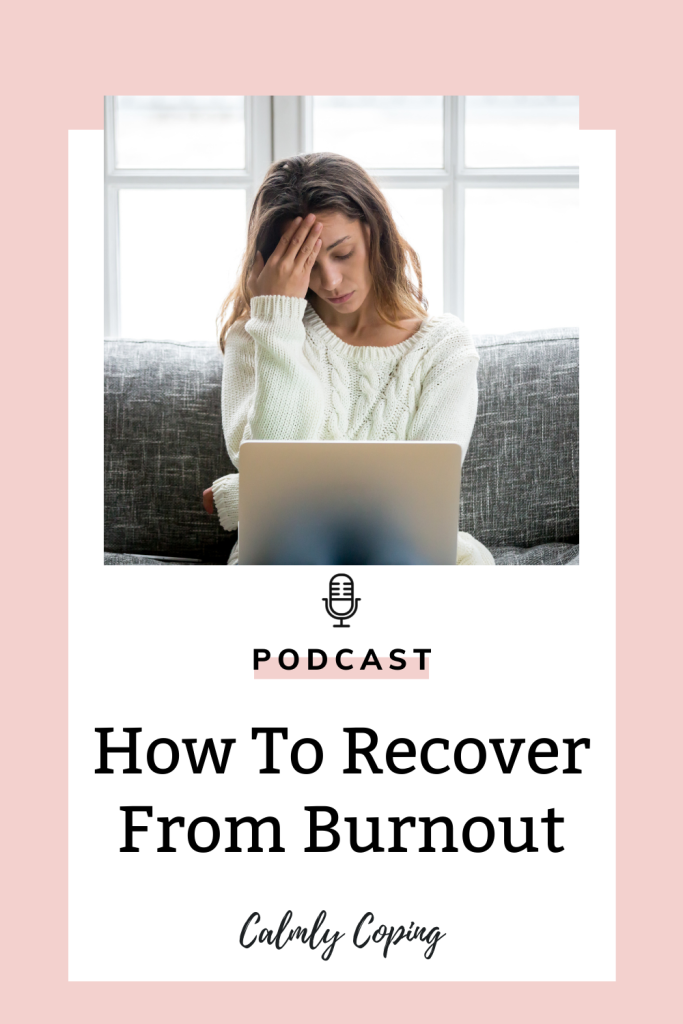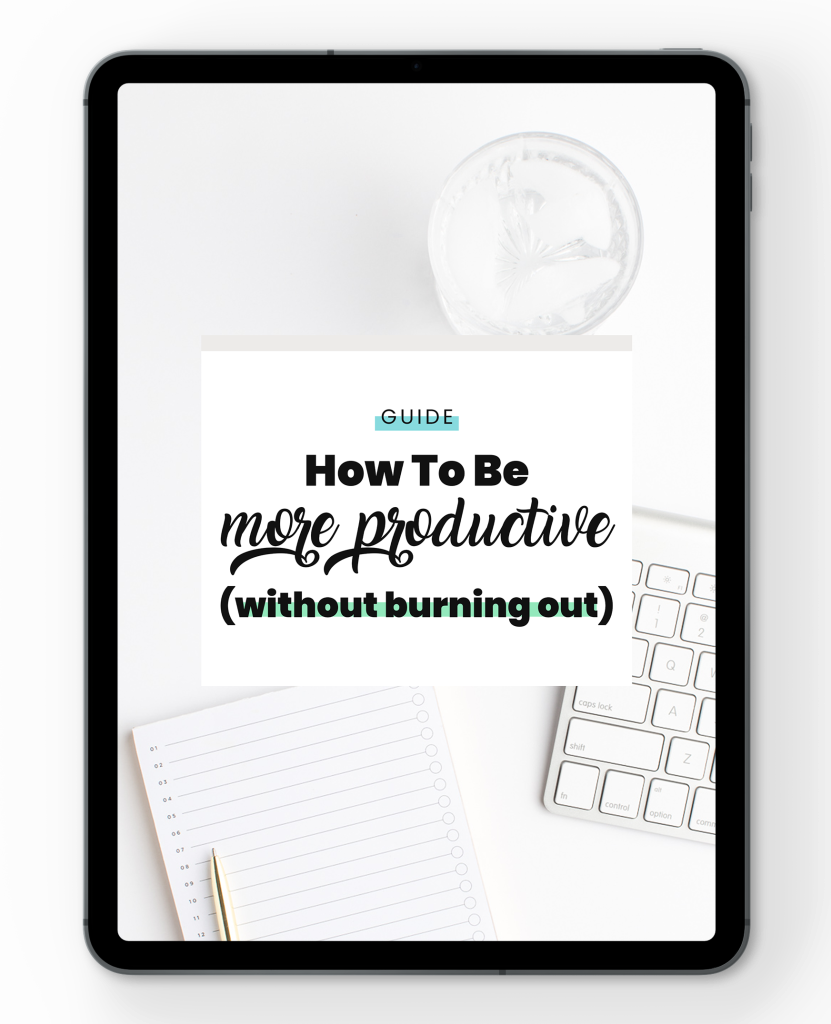Listen Now:
How To Recover from burnout
Burnout is a state of emotional, physical and mental exhaustion caused by excessive and prolonged stress. If you’re struggling with burnout, it can be difficult to see a way out of it, and it can have a negative impact on your mood, your motivation levels, your physical energy levels, your drive for work and more. It is absolutely possible to recover from burnout, keep reading to learn how.
Warning Signs of burnout
- Increased irritability at both work and in your personal relationships
- Feeling overwhelmed and having a never ending to do list
- Feeling constantly drained or having difficulty sleeping
- Difficulty waking up or getting out of bed in the morning
- Never feeling like you can relax or take a break
- Feeling pessimistic
- Feeling as though you don’t have support or you’re alone in your work or tasks
- Cynicism or dread about work
- Feeling like you can never get out of this stress
When you’ve reached burnout it can be difficult to see a way out and it can feel overwhelming. I want you to know that there is a way to recover from burnout. And the first step is recognizing that you’re feeling this way.
Now that you’ve done this, you can take the steps to recover, start feeling better and take the best steps forward for yourself.
So just as a note, I’m going to be focusing primarily on how to recover from burnout in your career in this article, but some of the tips may be helpful if you’re struggling from caregiver burnout as well.
Burnout rates are high for those in helping professions, jobs with high workloads and high demands, competitive school programs like graduate programs, medical school, and law school in entrepreneurs or self-employed people and in jobs where you feel like you have little control.

The Two Categories of Burnout
One study in the journal of graduate medical education looked at internal medicine residents struggling with burnout. (The medical field is a specialty with one of the highest rates of burnout.) In this study they identify two different categories of burnout.
The first was circumstantial burnout and the second was existential burnout.
Circumstantial burnout is stemmed from “self limited circumstances and environmental triggers.” So this essentially means that you’re feeling burnt out because of your work circumstances or things that are triggering you in your personal life or at work. “In contrast, existential burnout stemmed from a loss of meaning in medicine and an uncertain professional role.”
This is of course, specific to medicine because this is what they looked at in this study, but I also believe that this applies to any field because I’ve personally experienced this. I’ve also seen this with my clients and I’ve also seen this in other articles online. What this means is that you feel like you don’t have a purpose in your career, in your field of study, and you’re not sure as to what your role is or what your future is.
There were study participants who identified in either category or some who had a mix of both circumstantial and existential.
Recovery from Circumstantial burnout
Recovery from circumstantial burnout arose from:
1. Resolving workplace challenges
The number one tip to recovery from circumstantial burnout in this study was resolving workplace challenges. This includes things like interpersonal stress, such as having disagreements with other colleagues. The solution might include changing who they were working with or addressing that interpersonal stress.
So this can be one way to address burnout. It depends on what the root is and to identify: is this a conflict with a coworker or a supervisor? And how can you possibly address that?
2. Nurturing your personal life
The second tip in order to recover from circumstantial burnout was from nurturing their personal lives. In this case, people were triggered into burnout because of personal stressors. So this could include relationship and financial problems, and recovery from burnout included addressing these external triggers and working on financial stress or relationship stress so that it would not bleed into their work and their professional lives
3. Taking time off
Tip number three that helped with recovery from circumstantial burnout was taking time off. So this just includes having a personal life outside of work, taking time for personal hobbies, time with loved ones, activities that you enjoy time for rest, all that stuff.

Recovery from existential burnout
So when we’re looking at existential burnout, here’s are the things that this study found helped with recovery from this existential burnout.
1. Recognizing the burnout and feeling validated
So number one was recognizing the burnout and feeling validated. This just includes having awareness that you’re feeling burnt out, not taking it personally, and not seeing it as there being something wrong with you. It’s all about recognizing that you are doing well and feeling validated, whether it’s by supervisors or coworkers or family members, and just having that recognition that you’re doing the best that you can.
“As one resident noted: ‘burnout is largely a reflection of your own perception of yourself, of being incompetent and inferior and weak. Until I really started talking about it, I don’t feel that the progress really headed in the right direction.'” If you’re struggling with existential burnout, this is when it can be important to just have that awareness and just talk about it and get it out.
2. Connecting with colleagues and others
Number two that helped with existential burnout was connecting with patients and colleagues. So this just means connecting with those around you and not isolating yourself. When you’re isolating yourself, that’s going to result in increased stress in more negative thinking and just feeling like you’re not supported.
That’s why it can be so important to connect with others around you, whether it is colleagues, clients, patients, whomever it is that you work with.
3. Finding meaning
Tip three that helped with recovery from existential burnout was finding meaning. So this is finding a meaning and a purpose in your career. This can be really important.
This includes recognizing: what is the meaning that you have in what you’re doing and why is this so important for you? This can be the value and purpose in helping others or in doing something that you love and that helps you to feel great. Or it could be in doing something that supports the environment, whatever it is that connects to some sort of meaning and purpose that is important to you personally.
4. Redefining your professional identity and role
And number four was redefining a professional identity and role. So many participants in this research study stated that burnout came from uncertainty in their role and their professional identity. And this can occur at the beginning of a career. Maybe if you’re not feeling competent in school, or if you don’t have have clarity on what your role is and what your future goals are.
That’s why it can be important to recognize that, especially if you’re in the beginning stages, it’s normal to feel like you don’t know everything. As you grow and become more experienced in the field, then you’re going to become more knowledgeable and things are going to become more automatic.
Practical tips to Recover From Burnout
1. Set Clear Boundaries Between Work and Personal life
One study on smartphone use work-home interference and burnout found that smartphone use is positively related to work-home interference, which means that the more people were using their smart phones, the more that their work was interfering with their home lives.
And they also found that there was a positive relationship between work home interference and levels of burnout for intensive smartphone users. So what this means is that the more that people were using their smartphones, the more they were likely to have interference from work at home and the more likely they were to be burnt out.
This emphasizes the importance of having those clear boundaries regarding smartphone use during after work hours, especially when this smartphone use is related to things like checking email or checking social media, especially when it’s for work or anything else that is going to bring that work life into your personal life.
Creating these boundaries can be even more difficult when you work from home. That’s when it can help to try creating specific work hours and have a location in your home that is dedicated specifically to work. Let’s say you decide that your working hours are from 9:00 AM to 5:00 PM and you have a desk in your living room or in your bedroom or a specific office just for work.
And this can also involve disconnecting from work and email and any other interruptions outside of those hours and locations. This is really important when it comes to burnout. And of course, different employers are going to have different expectations, but I highly suggest starting here to create those boundaries so that your work life is not constantly bleeding over into your personal life and you’re having that time to really recharge and to get a separation from work.

2. Practice self-care
Tip number two is to practice self-care. This can include anything like exercise, hobbies that you enjoy, eating healthy, spending time with friends and family. Just do anything that you enjoy that is not related to work.
And if you can do one thing a day then great. That’s a great way to start trying to integrate some self-care.
3. Communicate with your supervisor
Number three is to communicate with your supervisor and ask for help if needed. So this can be really helpful because your supervisor might not even know that you’re struggling and they might not even know that things aren’t working out for you.
And I’m sure that your supervisor wants you to do your best. So that’s when it can be important to just communicate to them what’s going on and how you’re feeling. And let them know what you need to feel supported in your workplace or in your school and see if any changes can be made. Maybe it’s letting them know that it’s really important for you to have regular feedback on how you’re doing. Or maybe it’s asking if tasks can be delegated to your colleague or whatever other changes you feel might be helpful.
4. Seek out support from loved ones
Tip number four is to seek out support from loved ones, friends, family, or your partner. Maybe that includes getting help with chores at home if this is a busy time for you at work. Maybe it’s giving you more space when you’re done with work so you have that time to disconnect and to get into relaxation mode. Ask for help if you need it and try to be more open when it comes to communicating what’s coming up at work for you.

5. Rest, Relax, and recharge
Number five is to rest, relax, and recharge. So this includes things like making sure you’re getting enough sleep. Maybe that includes taking naps during the day if you’re able to, even if it’s like a 20 minute nap, this can be really helpful. And things like taking regular breaks throughout the day.
So even taking a 15 minute break two or three times a day can be really helpful to allow you that space to rest and recharge.
6. Reflect on your why
Tip number six is to reflect on your why: your meaning and your purpose. Do you feel fulfilled by what you’re doing? And is that important to you?
Not everybody needs to feel like they’re fulfilled by their job. Some people are okay with just getting a paycheck and going home and then forgetting about it. But if you feel like it’s really important and valuable for you to feel fulfilled by what you’re doing, then it’s worth reflecting upon and reassessing.
Is your work something that you feel adds value to your life and you feel aligns with your values and your purpose?
You can recover from burnout
Those are my six tips. I hope that that was helpful for you. And my action tip for you is to take things one step at a time and try implementing one of these tips today, depending on which one resonated with you the most to help you start learning how to recover from burnout.
Recovery from burnout can take time. So have patience and know that you’re making progress every day. And there is nothing wrong with you for feeling this way!
Leave a comment below letting me know your thoughts!
















